|
|
|
Sort Order |
|
|
|
Items / Page
|
|
|
|
|
|
|
| Srl | Item |
| 1 |
ID:
184729


|
|
|
|
|
| Summary/Abstract |
This study analyses the intricate relationship between sanction-based accountability and bureaucratic shirking. Drawing on an original survey conducted among Chinese civil servants, it addresses the question of whether sanction-based accountability can effectively regulate the conduct of public officials and provide a cure for bureaucratic shirking. The study identifies the characteristics of shirking behaviour in the Chinese bureaucracy and distinguishes three major patterns: evading responsibility, shifting responsibility and reframing responsibility. The findings indicate that sanction-based accountability may contain some obvious and notorious slacking types of behaviour, such as stalling and inaction, but government officials may distort or reframe their responsibilities to cope with accountability pressure. Empirical evidence suggests that owing to some “strategic” adjustments in bureaucratic behaviour, flagrant shirking is replaced by more subtle ways of blame avoidance, such as playing it safe or fabricating performance information. Sanction-based accountability therefore does not offer a panacea for bureaucratic shirking.
|
|
|
|
|
|
|
|
|
|
|
|
|
|
|
|
| 2 |
ID:
068329
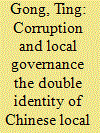

|
|
|
| 3 |
ID:
058461
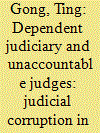

|
|
|
| 4 |
ID:
184997
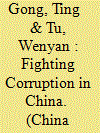

|
|
|
|
|
| Summary/Abstract |
This article provides an overview of the decades-long fight against corruption in China, focusing on its trajectory, dynamics, and impact. Corruption has long been a threat to China’s social stability, its economic development, and even the legitimacy of the regime. Equally notable are the numerous efforts made by successive generations of the Chinese leadership to control and prevent corruption. While goals may have remained the same across different periods, anti-corruption strategies and methods have changed considerably, moving from sporadic campaigns to more institutionalized methods and from power-driven rectification to rule-based integrity management. The current anti-corruption drive, launched after Xi Jinping took power at the 18th National Party Congress in 2012, not only has demonstrated novel features, suggesting a multi-pronged approach, but also is unprecedented in its breadth, depth, and severity. What are the dynamics of China’s fight against corruption? Has the increasingly intense crack-down been able to contain corruption? How can we understand the impact and effectiveness of anti-corruption enforcement in China? The six articles, including this one, in this special issue provide answers to these questions.
|
|
|
|
|
|
|
|
|
|
|
|
|
|
|
|
| 5 |
ID:
117715
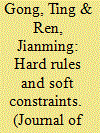

|
|
|
|
|
| Publication |
2013.
|
| Summary/Abstract |
The initial paragraphs of this article outline the broad themes of this special section, drawing attention to changing perceptions and definitions of corruption and to corruption prevention practices in Greater China. The remainder of the article focuses on a particular theme: the relationship between conflicts of interest and corruption in both theoretical terms and in its application in mainland China. Conflicts of interest are conceptualized as the incompatibility between the public interest associated with official duties and interests derived from the private domain. Such conflicts do not always necessarily lead to corruption and may be distinguished from it. By examining the way in which they are regulated in China, we argue that although an intricate web of rules has been established, regulations alone cannot guarantee ethically sound behaviour if there is no supportive value framework of like-minded civil servants. Rules require interpretation and if this discretion means that civil servants choose to follow an administrative culture and personal values that conflict with the regulations, they will have little effect. Hard rules may mean soft constraints.
|
|
|
|
|
|
|
|
|
|
|
|
|
|
|
|
| 6 |
ID:
139264
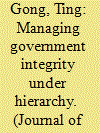

|
|
|
|
|
| Summary/Abstract |
In contrast to the early campaign style anti-corruption strategy based on nationwide uniformity, disparate local integrity initiatives and programs have proliferated in China in recent years. Local innovation in managing government integrity has been encouraged by the Center. Drawing on the author's fieldwork in Guangdong, this article investigates the rationale behind such development and addresses the question of why the central leadership has become receptive to local initiatives in cadre management, an area where political conformity was deemed necessary by an authoritarian regime. It suggests that the strategic adjustment testifies to the institutional failure of the earlier anti-corruption regime that manifested in, inter alia, an acute agency loss problem. The emerging approach to integrity management nevertheless has paradoxical institutional roots. It indicates some new thinking by the central authorities on holding local governments responsible for integrity management. Just as clearly, the adjustment is also driven by the Center's concern about losing control and its desire to ‘manage’ government integrity under hierarchy.
|
|
|
|
|
|
|
|
|
|
|
|
|
|
|
|
| 7 |
ID:
085501
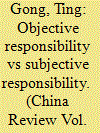

|
|
|
|
|
| Summary/Abstract |
This paper extends the ethical responsibility theory to an analysis of the internal supervision regulation, promulgated by the Chinese Communist Party (CCP) in 2004. It examines not only the content of the ISR but also the socio-economic and ideological background to see how the document was born under the pressure for strengthening intra party democracy and combating corruption.
|
|
|
|
|
|
|
|
|
|
|
|
|
|
|
|
| 8 |
ID:
163663
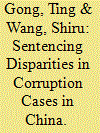

|
|
|
|
|
| Summary/Abstract |
In China, the dramatic increase in the number of trials and convictions of corrupt officials leads to the question of how they were sentenced and by what criteria. The puzzle is, in particular, to what extent judicial discretion plays a role in sentencing corrupt officials and, if judicial discretion does exist, how the discretionary power is exercised. This article addresses these questions based on 7304 court judgments in 2014–15, which were obtained from the official website of the Supreme People’s Court. The authors’ analysis reveals strong evidence of the presence of a high level of judicial discretion and considerable inconsistency in court judgments. This article further explores the possible explanations for sentencing disparities in corruption cases to show how extra-judicial factors may influence judicial decisions.
|
|
|
|
|
|
|
|
|
|
|
|
|
|
|
|
| 9 |
ID:
185002
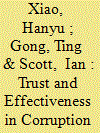

|
|
|
|
|
| Summary/Abstract |
Positive public perceptions of trust and effectiveness are critically important for institutions engaged in corruption prevention. If these perceptions form an insulated mutually reinforcing virtuous circle, then the anti-corruption agency can benefit from solid community support in pursuit of its goals. These ideal conditions, however, are often disrupted by exogenous factors that may stem, for example, from declining trust in government as a whole or evident inability to deal with corruption in high places. In this article, using Hong Kong as an example, we examine how its Independent Commission Against Corruption (ICAC) managed to build and retain trust in a turbulent environment but also how perceptions of its effectiveness were adversely affected by exogenous factors. The analysis is based on the ICAC’s surveys of attitudes toward corruption and on our own survey, conducted in mid-2020, which focused directly on significant indicators of trust and effectiveness.
|
|
|
|
|
|
|
|
|
|
|
|
|
|
|
|
| 10 |
ID:
177625
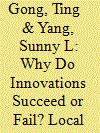

|
|
|
|
|
| Summary/Abstract |
Local innovations have proliferated in China in recent years. The huge universe of local initiatives results from economic and administrative decentralization. Various challenges facing China's unprecedented market-driven reform invite innovative solutions as well. What happens to the innovations after they were launched? Are they institutionalized locally and diffused nationwide? Or do they merely perform the function of window dressing and fail to achieve anything? Drawing on in-depth case studies of local anti-corruption reform, this article attempts to address these questions. It offers a two-dimensional conceptual framework of institutionalization and diffusion to examine what has happened to locally initiated anti-corruption measures. On that basis, a fourfold classification of innovation trajectories is identified to help explain why some innovations have suceeded while others failed. The findings indicate that local innovations have different developmental trajectories not so much because of their internal characteristics but because of the contextual constraints they face. Policy innovation is more of a process of political construction than a process of selecting better policy tools. This may be particularly true for anti-corruption reform that, as our cases show, requires strong political will, public embracement, and legal support.
|
|
|
|
|
|
|
|
|
|
|
|
|
|
|
|
|
|
|
|
|